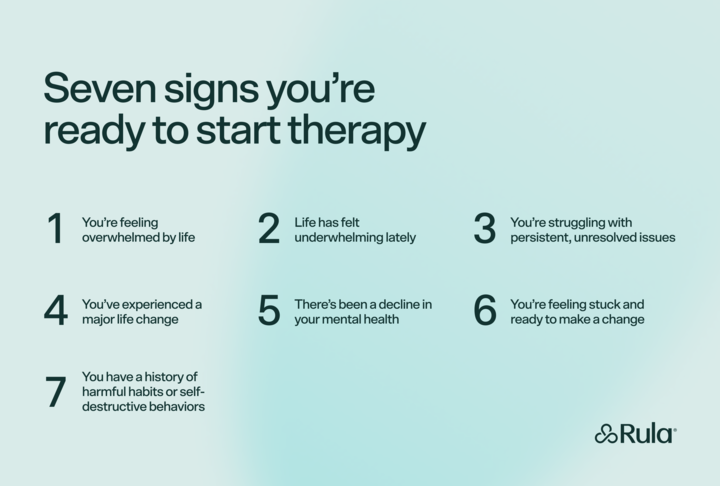Talk therapy is a helpful tool for anyone interested in improving their mental well-being. It can help you build healthier habits, manage difficult emotions, and prioritize personal growth.
Research shows that most people who go to therapy see an improvement in their mental health symptoms and ability to function in daily life.
Preparing for therapy can help make sure your experience is effective. This includes choosing the right therapist for your needs and finding ways to use your new skills outside of sessions.
The goal of talk therapy is to help people improve their mental health. This may sound broad, but that’s the beauty of it. Depending on your needs, therapy can help you build healthier habits, navigate major life changes and transitions, or simply reconsider your outlook on life. It’s also an opportunity to share your thoughts in a safe, judgment-free space.
“If you’re in a phase of your life where you don’t have anyone trusted you can lean on, then a therapist can temporarily serve that role for you,” said Lolly Coleman, MS, LMFT.

Seven signs you’re ready to start therapy
There’s no one specific sign that you should see a therapist. Instead, it’s more of a feeling that you’d benefit from professional mental health support. Here are some common reasons people decide to start (or restart) therapy.
1. You’re feeling overwhelmed by life
We live in a world of hard deadlines, incessant group chats, and neverending to-do lists. Life can be stressful, so it makes sense if you feel mentally and physically exhausted at times.
Feeling exhausted and overwhelmed can make it hard to focus, think clearly, or make decisions. Other signs of being overwhelmed include irrational thoughts, mood changes, trouble thinking and making decisions, and withdrawal from friends and family.
If this sounds familiar, consider working with a therapist to discover healthy coping strategies to help you improve your functioning and feel your best. Without proper support, exhaustion can impact your career, relationships, and ability to take care of yourself.
The care you need, when you need it
Learn how Rula can support your mental health journey
2. Life has felt underwhelming lately
On the other hand, maybe you haven’t been feeling much of anything lately. If you’ve been in a funk or struggling to enjoy hobbies and activities that used to bring you joy, consider seeking professional help.
Therapy helps people explore what is causing those emotions. This may include a lack of purpose or unfulfilling relationships. It provides tools to help you find greater satisfaction and meaning in life.
3. You’re struggling with persistent, unresolved issues
Another reason to start therapy is to address any ongoing problems or issues in your life. “If you notice patterns of struggle in your life, it can be really helpful to work with a therapist to better understand why these problems continue to come up for you,” explained Micaela Gonzalez, LMFT.
“A lot of times, we repeat patterns subconsciously, and they can be so automatic yet so destructive. And until we really understand the ‘why,’ it is hard to change these patterns,” says Gonzalez.
4. You’ve experienced a major life change
Change can be exciting and even necessary for growth, but it can also be scary when you don’t know how to process and cope with the transition. Switching jobs, becoming a parent, and ending a relationship are major life changes that can trigger the need for therapy.
Therapy provides a safe space to explore the emotions and challenges that come with life transitions. And with the right therapist, you’ll learn to embrace new opportunities, improve your resiliency, and manage change with confidence.
5. There’s been a decline in your mental health
Recent changes to your mental well-being — like increased sadness, irritability, or difficulty concentrating — may be signs that you’d benefit from seeing a therapist.
A decline in your mental health could mean you have an undiagnosed mental health disorder. For example, becoming sad or anxious after having a new baby may be signs of postpartum depression. And intrusive thoughts could be a symptom of trauma, depression, or an anxiety disorder like obsessive-compulsive disorder (OCD).
Although unexplained mental health symptoms can feel overwhelming, working with a therapist is the best way to understand why and how your mental health symptoms are affecting your quality of life.
6. You’re feeling stuck and ready to make a change
Therapy can be an effective tool for self-improvement and personal growth. Whether you’re looking to improve your daily mood or switch careers, a therapist can provide accountability as you set realistic goals to make meaningful change.
And if you’re feeling unmotivated or uncertain about where to start, therapy can help you define your values and goals. It can also help you identify unhealthy patterns that may be getting in your way.
7. You have a history of harmful habits or self-destructive behaviors
We all have different ways of coping with our problems. There are healthy outlets, like meditating or confiding in a friend. And then there are some less constructive alternatives, including self-harm, unhealthy substance use, emotional eating, and self-isolation.
If you default to risky or self-destructive behaviors when life gets tough, consider meeting with a therapist to discover other strategies and solutions for managing your emotions.
Healthy coping mechanisms can reduce stress, improve emotional regulation, and increase problem-solving abilities. Plus, therapy can even help you identify any underlying issues driving your harmful habits and behaviors.
Does therapy work?
You may be wondering if therapy can actually help you reach your mental health goals. The short answer is yes!
According to the American Psychiatric Association (APA), most people who receive therapy see an improvement in their mental health symptoms and are better able to function in their daily lives.
That said, several factors can influence therapeutic success. To get the most out of your therapy sessions, you’ll want to find the right therapist for your needs. Many people see the greatest improvement from more frequent sessions at the start of treatment. When you discuss your treatment plan with your therapist, you may want to consider weekly or bi-weekly sessions.
It’s also important to remain emotionally present and engaged throughout the process, even after those first few sessions. A study from the 1980s found that half of people receiving therapy improved after eight sessions, and 75% improved after six months.
And finally, therapy doesn’t end when you say goodbye to your therapist. For optimal healing and growth, find ways to practice what you learn during therapy outside of your sessions.
Find a therapist with Rula
If you’re ready to prioritize your mental and emotional health, consider seeking professional support. Therapy provides a safe and confidential space for people to resolve conflict, navigate major life changes, and build healthier habits.
Rula can help you find a therapist who takes your insurance, is accepting new patients, and matches your list of criteria. For example, we can find a provider who understands your cultural needs, specializes in a certain diagnosis, or has availability at certain times of the week.
And, our network of over 15,000 therapists means you can be seen as soon as tomorrow.
Rula's editorial process
Rula's editorial team is on a mission to make science-backed mental health insights accessible and practical for every person seeking to better understand or improve mental wellness.
Members of Rula’s clinical leadership team and other expert providers contribute to all published content, offering guidance on themes and insights based on their firsthand experience in the field. Every piece of content is thoroughly reviewed by a clinician before publishing.




